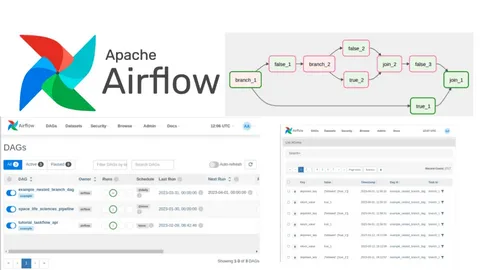Workflow management tools are essential for automating and orchestrating complex data pipelines. Two of the most popular tools in this domain are Apache Airflow and Spotify Luigi. Choosing between them depends on several factors, such as scalability, ease of use, and integration capabilities. If you are pursuing a Data Scientist Course, understanding these tools will enhance your ability to manage data workflows effectively.
Overview of Apache Airflow
Apache Airflow is an open-source workflow automation tool designed to programmatically author, schedule, and monitor workflows. Airbnb initially developed it and later adopted it by the Apache Software Foundation. One of Airflow’s main advantages is its scalability, making it a preferred choice for large-scale data workflows. Mastering Airflow can help you handle complex ETL processes efficiently if you are enrolled in a course.
Overview of Spotify Luigi
Spotify Luigi is another open-source workflow management system that handles long-running pipelines with dependencies. Spotify developed it to automate its data workflows. Unlike Airflow, which uses Directed Acyclic Graphs (DAGs) to define workflows, Luigi employs a task-based approach. Luigi provides a simpler yet effective way for students and professionals taking a course to manage workflows.
Key Differences Between Airflow and Luigi
While both tools aim to streamline workflow automation, they differ in various aspects. Apache Airflow offers advanced scheduling, monitoring, and scalability, making it ideal for big data applications. In contrast, Luigi focuses on simplicity and ease of use, catering to smaller-scale workflows. If you are studying a Data Scientist Course, understanding these differences can help you select the right tool based on your project needs.
Ease of Use
Airflow has a web-based UI allowing users to visualise workflows and track execution. It supports task retries, dependencies, and logging. On the other hand, Luigi has a command-line interface with a simpler structure. If you are new to workflow automation and taking a Data Science Course in Hyderabad, Luigi might be easier to start with, while Airflow offers more flexibility for complex workflows.
Scalability and Performance
Apache Airflow is the better choice for enterprises managing large data pipelines due to its ability to handle distributed execution. It integrates seamlessly with cloud services like AWS, GCP, and Azure. While efficient for smaller workflows, Luigi lacks the same scalability level. Professionals attending a course should consider Airflow if they plan to work on large-scale data projects.
Dependency Management
Airflow defines workflows using DAGs, allowing complex dependency management across multiple tasks. Luigi, in contrast, enforces a task-based approach with built-in dependency resolution. This makes Luigi easier for smaller workflows but less flexible for intricate dependencies. If you are learning a Data Science Course in Hyderabad, experimenting with both tools can give you practical insights into dependency handling.
Integration and Extensibility
Through its extensive plugin system, Airflow offers a range of integrations with databases, cloud services, and third-party tools. It supports Python, SQL, and shell scripts for task execution. Luigi, while extensible, has fewer built-in integrations. Airflow will be a more versatile option if your career path after completing a Data Scientist Course involves working with diverse data sources.
Monitoring and Logging
Airflow’s web-based UI allows users to track task execution, identify failures, and rerun tasks when necessary. It also provides extensive logging capabilities. Luigi offers basic monitoring through its command-line interface but lacks the same level of visualisation. If you are pursuing a Data Scientist Course, learning Airflow can help you manage workflow failures more efficiently.
Community Support and Documentation
Apache Airflow has a larger community, extensive documentation, and active development support from the Apache Software Foundation, making it a more sustainable choice for long-term projects. While supported by Spotify, Luigi has a smaller community and fewer resources. If you are taking a course, leveraging Airflow’s vast community can be beneficial for troubleshooting and learning best practices.
Use Cases
- Airflow: Suitable for big data processing, machine learning workflows, and distributed task execution. It is widely used in industries dealing with complex ETL processes.
- Luigi: Best for smaller workflows, data aggregation tasks, and job automation that does not require extensive monitoring.
If you are exploring a course, consider the type of data workflows you will be working on to choose the most suitable tool.
Which Tool Should You Choose?
The decision between Airflow and Luigi depends on your specific needs:
- Choose Airflow if you need scalability, advanced scheduling, and cloud integrations.
- Choose Luigi if you prefer simplicity and a lightweight workflow management system.
Both tools can benefit students and professionals enrolled in a Data Science Course in Hyderabad, as they serve different purposes in data science and engineering.
Conclusion
Apache Airflow and Spotify Luigi are powerful workflow management tools with strengths and weaknesses. Airflow is ideal for large-scale, distributed workflows with complex dependencies, while Luigi excels in simpler, linear task execution. If you are pursuing a course, gaining hands-on experience with both tools can provide a competitive edge in the data science field.
ExcelR – Data Science, Data Analytics and Business Analyst Course Training in Hyderabad
Address: Cyber Towers, PHASE-2, 5th Floor, Quadrant-2, HITEC City, Hyderabad, Telangana 500081
Phone: 096321 56744








